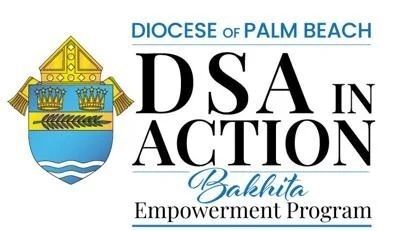
Editor’s note: This series of articles looks at the many programs that are financially supported by the Diocesan Services Appeal in the Diocese of Palm Beach. Donations to the DSA stay local, financing 47 Catholic initiatives in our five counties. The funding protects the most vulnerable among us, from the unborn child to the elderly, provides food for those who are hungry, sustains our Catholic schools, supports seminarians preparing for the priesthood and much more. This installment in the series explores Catholic Charities’ Bakhita Empowerment Program.
RIVIERA BEACH | Crime statistics show that Florida ranks third among states for incidents of human trafficking. Even with that type of evidence, many people still don’t believe that victims are being held against their will or forced to work in southern Florida.
The main goal of the Bakhita Empowerment Program of Catholic Charities “is to help victims of human trafficking to obtain self-sufficiency after they have been rescued by law enforcement,” said Sandra Perez, administrator of the program. Another goal of the program is to create awareness of human trafficking in the community.
So, what is human trafficking? According to the U.S. Department of Homeland Security, human trafficking involves the use of force, fraud or coercion to obtain some type of labor or commercial sex act.
Every year, millions of men, women and children are trafficked worldwide — including right here in the United States. It can happen in any community, and victims can be any age, race, gender or nationality. Traffickers might use violence, manipulation, false promises of well-paying jobs or romantic relationships to lure victims into trafficking situations.
Since 2011, Catholic Charities of the Diocese of Palm Beach has provided assistance specifically to victims of human trafficking. Thanks to grants and donations to the Diocesan Services Appeal, which supports Catholic Charities and many other services in the five-county region, the agency has continued to aid those traumatized by traffickers.
Perez said the financial support means the world to her, who has seen firsthand how victims have suffered physically, emotionally and spiritually.
“Sometimes you hear a story and say, ‘Poor thing,’ but it’s not the same when you see a person face to face and you see the needs and the traumas and all the essentials that need to be covered, but your hands are tied because funds are limited,” she said. Donations through the DSA go a long way toward helping trafficking victims live a healthy, independent life.
A former trafficking victim spoke a few months ago at a Luncheon 4 Life presentation in Palm Beach Gardens that focused on the Bakhita Empowerment Program. The woman told how she was manipulated by a trafficker and forced to work as a prostitute and dancer, but not allowed to keep any of the money she earned.
With the help of Catholic Charities, the woman turned her life around and is now working as a nurse. “I utilized every resource Catholic Charities provided me with,” she said.
“Today, I celebrate the path and journey that God has put me on,” the former victim said. “In hopes of telling you some of my lifestyle, it may help one of you out there to give you the confidence and reassurance that you are stronger than you think you are.”
The Bakhita program works in collaboration with law enforcement agencies, other organizations and private citizens to identify and rescue trafficking victims. They are given free help with housing, transportation, employment, education, medical and dental care, food, clothing, personal items and legal services, Perez said. One essential need is usually counseling, which is provided through Catholic Charities.
“Counseling is key for them because of the trauma they have suffered,” she said. “They need counseling for sure. I would say 90 percent because some of them, even though they have trauma, because of their culture, they are not willing to go to a counselor. But the majority of them receive counseling services.”
The anti-trafficking program is named for St. Josephine Bakhita, who was kidnapped as a child in southern Sudan and sold into slavery in the late 19th century. She is the patron saint of victims of human trafficking.
Perez’s office employs five case managers who remain in contact with their clients to evaluate their needs and keep them moving toward self-sufficiency. Sometimes that contact may come with risks.
“Sometimes they have to meet a client in a place with the police standing by because a client has been followed by the trafficker,” Perez said. “For example, we know that they are at risk because the Palm Beach County Sheriff’s Office has communicated with us, saying, ‘This is a risky case. You have to take these precautions.’ We work in collaboration with them. That way the case manager feels more comfortable doing the job that they’re supposed to do.”
Assisting the survivors of human trafficking is a constant challenge, Perez said. When victims move past the trauma, it makes “you feel rewarded that it was worth everything that you did. You feel both frustrated and challenged all the time, but at the end you feel very well when you see them succeeding.”
The generosity of Diocesan Services Appeal donors supports the Bakhita Empowerment Program. The faithful’s participation in the appeal is a vital part of the diocese’s ability to provide this service. For more information about Catholic Charities’ anti-trafficking program, visit www.ccdpb.org/programs/anti-human-trafficking or email Perez at sperez@ccdpb.org. To donate to the DSA, visit www.DiocesePB.org/DSA.
To read this and other stories in Florida Catholic, click here.

